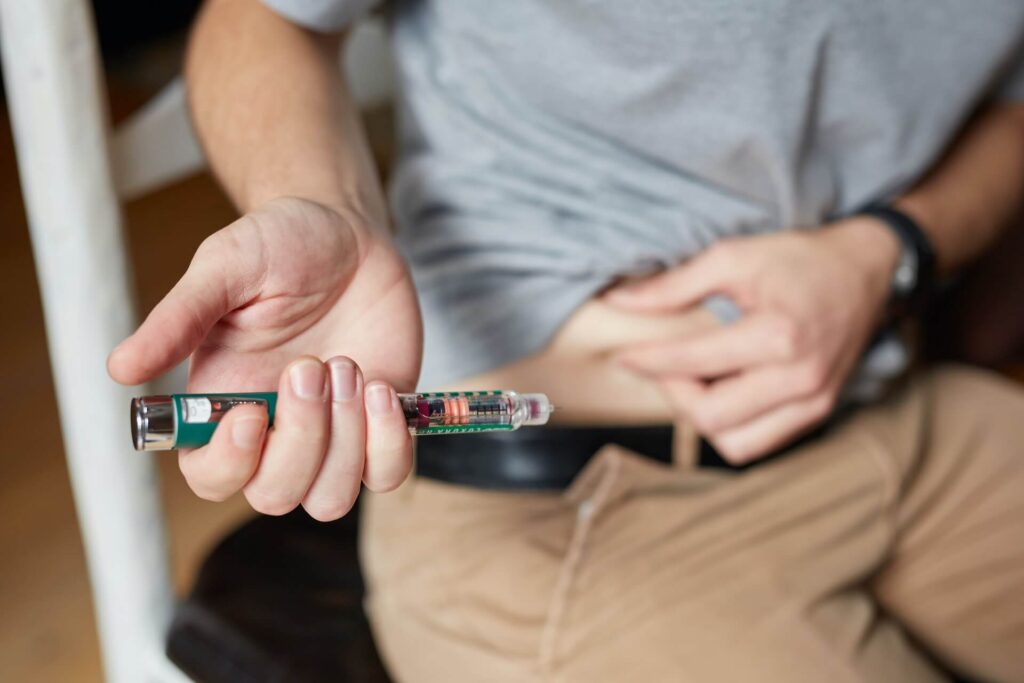
Ozempic (semaglutide) is a brand-name drug that is prescribed to manage blood sugar levels and reduce the risk of cardiovascular problems in certain individuals. This injectable solution falls under the drug class known as glucagon-like peptide-1 (GLP-1) receptor agonists next to Rybelsus and Saxenda. In this comprehensive guide, we will explore the dosage, forms, strengths, and usage of Ozempic.
Table Of Contents
ToggleWhat Is the Right Ozempic Dosage For Me?
The dosage of Ozempic prescribed by your healthcare provider will depend on the specific condition being treated and its severity. The goal is to find the smallest effective dosage that effectively lowers blood sugar levels. It is crucial to always follow the dosage instructions provided by your doctor. Let’s delve into the details of Ozempic dosage.
Ozempic Forms
Ozempic is available as a liquid solution in prefilled single-patient-use pens. These pens are designed for subcutaneous injections, which means the medication is injected just under the skin. With proper training from a healthcare professional, you may be able to administer the injections by yourself at home.
Ozempic Strengths
Ozempic prefilled pens are available in three strengths:
- 2 mg/1.5 mL of liquid solution. There are two pens with 2mg strength:
- One pen delivers 0.25-mg or 0.5-mg doses.
- Another pen delivers 1-mg doses.
- 4 mg/3 mL of liquid solution: One pen delivers 1-mg doses.
- 8 mg/3 mL of liquid solution: One pen delivers 2-mg doses.
Your doctor will determine the appropriate strength and dosage based on your individual needs.
Typical Ozempic Dosages
Normally, your doctor will initiate treatment with a low dosage and adjust it over time to achieve the desired effect. Here is a typical dosing schedule for Ozempic:
- Start with a dosage of 0.25 mg once per week for 4 weeks.
- Subsequently, your doctor may increase the dosage to 0.5 mg once per week, typically for a minimum of 4 weeks.
- If the 0.5-mg dosage does not effectively manage your blood sugar levels after 4 weeks, your doctor may further increase the dosage to 1 mg once per week or even the maximum dosage of 2 mg once per week. However, if the 0.5-mg dose is sufficient, your doctor will likely continue with that dosage.
It is important to note that your doctor will personalize the dosage based on your specific needs and response to the medication. Make sure to always follow the instructions provided by your healthcare provider.
How to Use Ozempic

Ozempic is administered through subcutaneous injections. The medication can be injected into the abdomen, upper thigh, or the back of the upper arm. If you also self-inject insulin for type 2 diabetes, you can inject Ozempic and insulin in the same body part, but avoid using the exact same spot to prevent skin irritation. It is essential to note that Ozempic and insulin should not be mixed in the same injection.
To ensure proper usage, follow these steps:
- Familiarize yourself with the instructions provided by your healthcare professional and the prescribing information of Ozempic.
- Clean the injection site with an alcohol swab and allow it to dry.
- Prepare the Ozempic pen according to the instructions provided.
- Hold the pen at a 90-degree angle to your skin and inject the medication.
- Dispose of the needle safely after use.
Remember to administer Ozempic on the same day each week, although the specific time of day is flexible. Whether you take it with or without food is also a matter of personal preference. If you have any concerns or questions about using Ozempic, consult your doctor or pharmacist for further guidance.
Missed Dose and Overdose
If you accidentally miss a dose of Ozempic, try to take it as soon as you remember. You can take a missed dose up to 5 days after the scheduled time. However, if more than 5 days have passed, skip the missed dose and resume your regular dosing schedule.
It is crucial to avoid taking more Ozempic than prescribed by your doctor, as exceeding the recommended dosage can lead to side effects or overdose. If you believe you have used too much Ozempic, contact your doctor immediately. In case of severe symptoms, call emergency services or go to the nearest emergency room.
The Bottom Line
Ozempic is a valuable medication for managing blood sugar levels and reducing the risk of cardiovascular problems in individuals with type 2 diabetes. Understanding the appropriate dosage, usage instructions, and potential off-label use is crucial for optimal treatment outcomes. Remember to always consult with your healthcare provider for personalized advice and recommendations.
Frequently Asked Questions
How is Ozempic dosed?
Ozempic is typically injected subcutaneously (under the skin) once a week on the same day each week. The specific dose may vary depending on your individual needs and your healthcare provider’s recommendations.
What is the recommended starting dose of Ozempic?
The standard starting dose for Ozempic is usually 0.25 mg once a week. Your healthcare provider may adjust the dose based on your blood sugar control and individual factors.
How is the dose of Ozempic adjusted?
Your healthcare provider may increase your dose to 0.5 mg once a week after 4 weeks of treatment if your blood sugar is not well controlled. In some cases, they may further increase the dose to 1 mg once a week.
When should I take Ozempic?
Ozempic can be taken at any time of day, with or without food. It’s important to take it on the same day each week to maintain consistency.
Can I self-administer Ozempic injections?
Yes, Ozempic is designed for self-administration. Your healthcare provider will show you how to properly inject it, and you can administer the injections at home.
Where should I inject Ozempic?
Ozempic should be injected into the fatty tissue just under the skin of your abdomen (belly) or thigh. Rotate injection sites to avoid repeatedly injecting the same area.
Is Ozempic prescribed for weight loss?
Ozempic is not approved for weight loss; however, it may be prescribed off-label for this purpose. Off-label use refers to the prescription of a drug for a condition other than its approved use. It is important to note that using Ozempic and another medication, Wegovy, which is approved for weight management, simultaneously can increase the risk of side effects. If you are interested in exploring the use of Ozempic or Wegovy for weight management, discuss it with your doctor.
Share:












